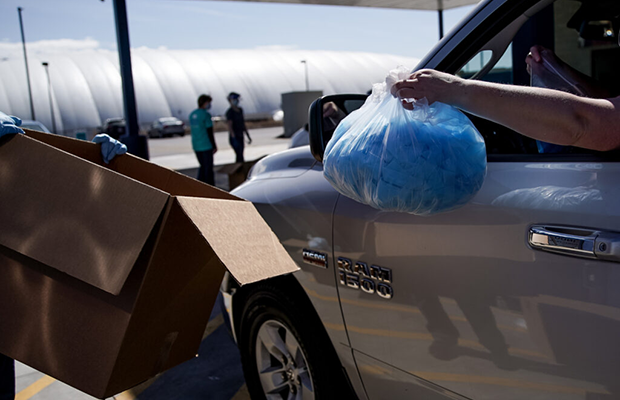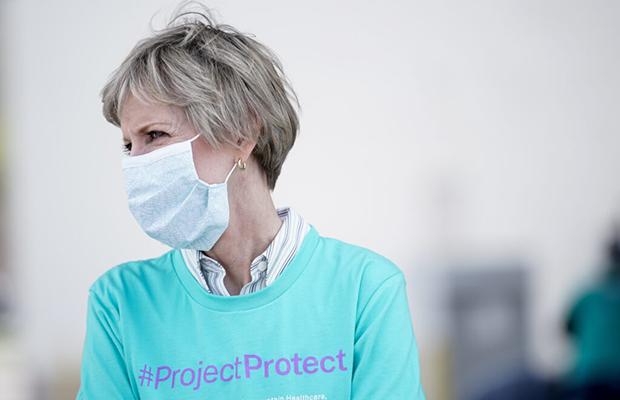How COVID-19 Mask Efforts Are Transmitting Faith
Contributed By Sarah Jane Weaver, Church News editor

Sister Reyna Isabel Aburto, Second Counselor in the Relief Society General Presidency, right, hands a face mask kit to Alicia Rawlins at the Deseret Industries thrift store in American Fork, Utah, on Tuesday, April 21, 2020. Some 10,000 volunteers have been using the kits to make 1 million clinical masks to protect health care workers during the coronavirus pandemic. Photo by Jeffrey D. Allred, Deseret News.
Article Highlights
- Project Protect is using volunteers to sew five million clinical face masks for Utah health care professionals.
- One million completed masks were collected in five locations across the Wasatch Front on April 25.
“It’s so great to feel like you live in a community where people love each other and want to help each other and take care of our frontline workers.” —Sister Sharon Eubank, Relief Society General Presidency
Related Links
- Learn how you can start a similar project in your area.
- Project Protect Seeking Help to Make 5 Million Face Masks for Health-Care Workers in Utah
- First Presidency Announces More Than 110 COVID-19 Relief Projects in 57 Countries
- Latter-day Saint Charities Responds to Coronavirus with Commodities and Financial Assistance Worldwide
General Relief Society President Jean B. Bingham stood in a near-empty parking lot of the Deseret Industries in Harrisville, Utah—where, for hours Saturday morning, car after car had lined up and delivered thousands of protective masks.
Donning her own protective gear and a ProjectProtect T-shirt, President Bingham carried the last donation to a bulging box—some of the one million collected in five locations across the Wasatch Front.
At a time filled with physical, economic, and emotional hardship, President Bingham had come to the front lines to thank the individuals and families here who had taken fabric home earlier in the week and sewn the masks.
Surveying mask after completed mask, she said she never questioned if the work would get done. She simply expected it.
That’s what members of the Relief Society do, she said. “We look around and we see what needs to be done. Each woman does that. And then it’s done quickly and done well.”
The masks were made for ProjectProtect, a charitable community initiative organized by University of Utah Health, Intermountain Healthcare, and Latter-day Saint Charities to provide five million clinical face masks and other types of personal protective equipment for Utah’s frontline health care professionals treating COVID-19 patients.
The project was immediately embraced by the community. In addition to the Relief Society and the three sponsoring organizations, ProjectProtect has been supported by community groups such as Festival of Trees Volunteer Network, Stitching Hearts, the Holiday Quilt Show and Auction, the Utah Quilt Guild, and many others, organizers report.
President Bingham’s counselors—Sister Sharon Eubank and Sister Reyna Isabel Aburto—also pitched in Saturday at mask collection sites in Riverton and Layton, Utah.
Watching the long line of cars wait to drop off completed masks, Sister Eubank—president of Latter-day Saint Charities—recalled a meeting weeks earlier with Dan Liljenquist, senior vice president and chief strategy officer at Intermountain Healthcare.
Liljenquist and other Utah-based health care providers had identified the need to prepare for a surge in COVID-19 cases and a conversing decrease in this type of protective medical gear. They contacted the Church and joined forces.
“We got together as a senior leadership team and said, ‘What can we do locally . . . to produce personal protective equipment to make sure our caregivers were safe?’” said Liljenquist.
The leadership team asked how many masks it was possible to make. Silence followed the suggestion that five million masks were needed.
Then came the follow-up question. “Can we do that?”
“I didn’t hesitate,” recalled Sister Eubank. “I just said, ‘Absolutely, this community will respond.’”

A screenshot of the front page of ProjectProtect.health shows how ProjectProtect works.
Julie Harris, representing the University of Utah at a drop-off location Saturday, said the community came together to answer the call for 10,000 volunteer sewers a week for five weeks. The community is “unbelievable[,]. . . gracious and kind,” she said.
“It’s so great to feel like you live in a community where people love each other and want to help each other and take care of our frontline workers.”
Tad Morley, an executive director with the University of Utah Health system, said the response is a result of the community characteristic to be self-reliant and resourceful.
The effort started as health care workers observed protective equipment supplies running low in other parts of the country. “So we were able to get a plan in place, get the material here, and then mobilize volunteers,” he said.
Sister Eubank added that “unlike other mask projects, which are also very useful in the community, this project makes medical-grade masks for uses in care centers, hospital systems, emergency rooms. So we sourced medical-grade material out of China, shipped it to Salt Lake City, cut it into kits, and then we needed the help of the community. This couldn’t be done, all of that work wouldn’t matter, if the community was not willing to give hours and hours of sewing masks.”
Sister Eubank said people always worry that the worst in people will surface in a crisis—that they will be selfish or there will be price gouging. “But my experience is the best in people also comes out. And you will see people want to participate, want to do something to show the goodness of humanity and to benefit people who are putting their lives at risk for all of us.”
It is something that happens all across the world, all the time, and “not just in a pandemic,” she added.

Sister Sharon Eubank, First Counselor in the Relief Society General Presidency, motions for a car to come to the front of the line while collecting homemade clinical masks at the Deseret Industries in Riverton, Utah, as part of the ProjectProtect initiative by Latter-day Saint Charities and local health care networks on Saturday, April 25, 2020. Photo by Spenser Heaps, Deseret News.
In Beira, Mozambique, for example, members of the local Latter-day Saint stake sponsored a mask project—not for themselves but for the traders in the dense market, where infection can spread rapidly.
Each family committed to make 100 masks from fabric purchased by the stake.
“But the interesting thing is they made them by hand; they didn’t have sewing machines,” she said. “So here are these families, sitting by kerosene light, sewing masks at night so that they can make their commitment of 100. And every one of them said, ‘This has brought the community together, and it’s brought our family together.’”
Sister Eubank said the project in Mozambique is “indicative of the spirit of how people are responding in their communities.”
She spoke of looking at photographs of the masks being passed out to the fishmongers and coconut traders in the market.
She heard that one elderly woman prays over every mask she sews—pleading for protection for the person who wears it. “It isn’t just cloth and sewing,” she said. “It’s actual faith that’s being transmitted.”
For more information visit ProjectProtect. Those looking for service projects in their own communities can visit JustServe.

Stephanie Lokey directs drivers arriving to donate homemade clinical masks at the Deseret Industries in Riverton,
Utah, as part of the ProjectProtect initiative by Latter-day Saint Charities and local health care networks on Saturday, April 25, 2020. Photo by Spenser Heaps, Deseret News.

A motorist drops off a bag of homemade clinical masks at the Deseret Industries in Riverton, Utah, as part of the ProjectProtect initiative by Latter-day Saint Charities and local health care networks on Saturday, April 25, 2020. Photo by Spenser Heaps, Deseret News.

President Jean B. Bingham, Relief Society General President, attends a collection drive for homemade clinical masks at the Deseret Industries in Ogden, Utah, as part of the ProjectProtect initiative by Latter-day Saint Charities and local health care networks on Saturday, April 25, 2020. Photo by Spenser Heaps, Deseret News.
